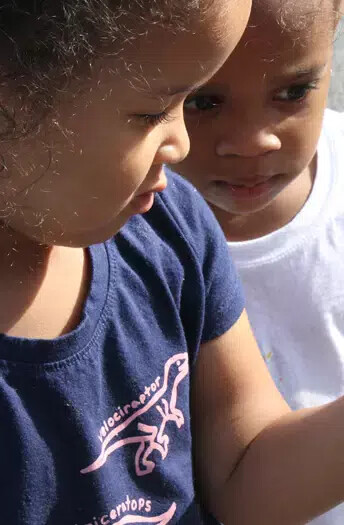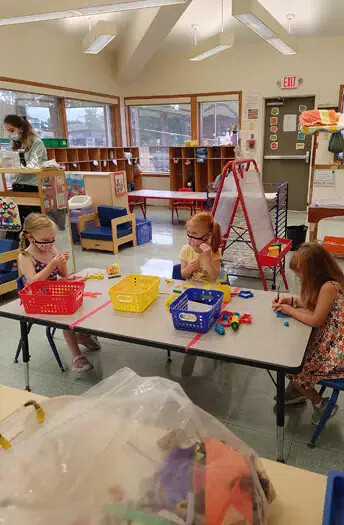Creative Curriculum
Children’s Campus utilizes the Creative Curriculum to organize our rooms into learning centers, and to use these developmentally appropriate centers in guiding children through the ages and stages of early growth. Each child’s development is carefully observed and lessons are planned within four domains of development: Social/Emotional, Physical, Cognitive and Language. Our teachers implement Creative Curriculum through the use of learning centers which include: Blocks, Dramatic Play, Toys and Games, Art, Literacy, Discovery and Sensory. With the assurance that their environment is predictable and familiar, the children can settle into learning and function as part of a community of learners.
Caterpillar Café
Our Caterpillar Café is a butterfly garden which has been certified by Monarch Watch as Monarch Waystation #2020, providing nectar and host plants for the Monarch butterflies. The children are able to observe the life cycles of the Monarch and many other butterflies as well as the life cycles of the plant materials in the garden.
Curriculum & Assessment
The Children’s Campus uses the Creative Curriculum™ Objectives for Learning and Development to reflect our understanding of young children’s natural developmental progression. Teaching teams use the four areas of developmental learning – social/emotional, physical, language and cognitive - as a flexible framework for planning learning experiences to promote the growth of each individual child rather than using a fixed curriculum guide. We develop our own plans to provide children with a variety of opportunities for learning and encourage broad exploration. We support children in doing as much for themselves as possible, given the time constraints of a part-day, part-year program. In addition, we strive to support a variety of social experiences by organizing our time and space to balance individual, pair, small group, and large group activities, making accommodations as necessary for children with disabilities and providing all children with access to semiprivate areas to play or work alone or with a peer. Staff members serve as coaches as children practice social skills involved in peer interactions, friendship formation, and conflict resolution. Throughout the day, we engage children in conversation, with extra support for peer conversation at snack and lunchtime.
Thematic Approach to Curriculum
The teachers prepare an engaging learning environment for exploring a theme, such as birds, artists, or transportation. We plan the themes to include opportunities for integrating key areas of content, including life, earth and physical science, as well as social studies and the arts. We choose a rich range of materials, including diverse technologies, to entice each of the children to engage in the thematic study. We use a group meeting time each day to set the stage for the investigation and introduce relevant concepts. Then the children pursue a variety of activities that reinforce the learning goals. We avoid commercial characters and prescribed products in favor of open-ended explorations that promote creativity and imagination. We also limit screen time to short periods of activity that are not otherwise possible in the classroom, such as child-controlled computer design or internet viewing of animals in their natural habitats. The staff monitors the activities, so that we may facilitate the children’s learning and challenge them at an appropriate level. Children’s explorations enrich their development of concepts related to the theme and strengthen their skills in all areas. We extend and apply their concepts by experimenting with various materials in the school, and they express their understanding by creating their own representations in a variety of media.
“Probably the most important learning your child will do will not involve academics. It will concern character, compassion, kindness, diligence, sacrifice and responsibility.” ~ Debbie Strayer
Explorations Enhance Skills
Through explorations, the children develop
- a sense of themselves as competent learners
- strategies for collaborating with peers and adults
- approaches to communicating their ideas verbally and visually
- means of discovering new ideas about physical properties
- skills for small motor manipulation of tools and materials as well as large motor actions, together with an awareness of health and safety practices
- means for expressing their creative ideas through drama, movement, music, and visual arts
Assessment Plan
Assessment is naturally integrated into the course of every day as ongoing teacher observation of group patterns and individual development is used to adjust the program to better support group and individual progress. Head teachers plan weekly and monthly, to identify children’s current interests and needs and then plan accordingly for the next week’s explorations. At times, these reflections indicate the need for altering the classroom environment, shifting the unit focus, trying new teaching strategies, etc. If concerns about individual children’s development arise and are not readily remedied via classroom adaptations, teachers initiate a dialogue with colleagues and parents to plan approaches to try at both home and school.
Twice per year, the teachers combine these informal assessment techniques with more systematic assessment of each child relative to the school’s developmental objectives for the purpose of describing each child’s developmental progress. Teaching teams work together to conduct these systematic assessments, though the child’s head teacher takes the lead in summarizing the findings and choosing work samples and anecdotal records. These descriptions are shared with parents, in writing. Staff–parent dialogue during conferences strengthens our understanding of each child’s developmental profile and often leads to ideas for individualizing both staff and parent support of children’s learning, as well as plans for smooth transitions into the next level of The Children’s Campus programming or to elementary school.
Occasionally, staff and/or parents identify the need for additional screening and referral for professional diagnostic assessment. In those cases, staff and parents typically include the Director in the dialogue for the purpose of more precisely identifying the focus for screening/diagnosis and to review the resources available to children and families in our community, which depends heavily on where the family lives (i.e., within the Branchburg School District or not, within Somerset or Hunterdon County or not, etc.) and what type of health insurance the family has.




